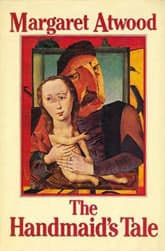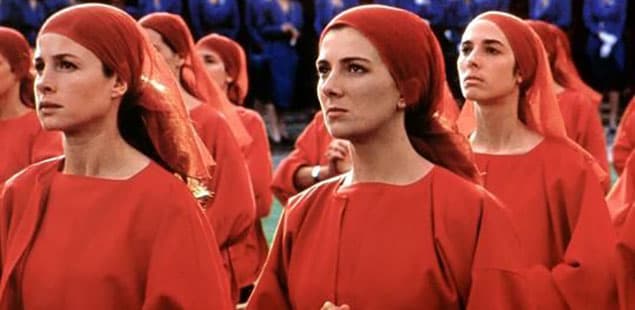The Handmaid's Tale
Critique • Quotes • At the movies
 First edition
First editionFirst publication
1985
Literature form
Novel
Genres
Literary, philosophical, science fiction, dystopian
Writing language
English
Author's country
Canada
Length
Approx. 109,000 words

Natasha Richardson is Kate, who resists the patriarchy in the 1990 film The Handmaid's Tale.
Film's improvements on tale don't go far enough
The Handmaid's Tale (1990): Film, 109 minutes; director Volker Schlöndorff; writer Harold Pinter; featuring Natasha Richardson, Faye Dunaway, Aidan Quinn, Elizabeth McGovern, Robert Duvall, Victoria Tennant
At first it seemed a bit of a mystery why I found myself mildly appreciating the film of Margaret Atwood's The Handmaid's Tale when so many fans of the novel absolutely hated it.
Then it hit me that both reactions were due to the film not capturing Atwood's distinctive writing style in the novel it was based on.
The tale was told in the novel mainly in a stream-of-consciousness style that gave free rein to Atwood's running commentary—her ironic authorial comments disguised as unspoken observations by the main character. A movie of course is a visual medium and, unless the director opts for an extensive voice-over narration, what we get is usually what we see. The protagonist's thoughts are inferred from her actions, her expressions and her interactions with other characters.
In the film of The Handmaid's Tale, the result may be seen by Atwood's readers as toning down the social analysis, as removing the trenchant commentary they look for in her books. But for one who finds the author's ironical irritating, the change is for the better.
Internal monologue aside, the film is actually quite faithful to the book. A surprising number of the major scenes and characters are represented, with a couple of twists added to the end to give the story more shape and resolution—something the novel could have used in my opinion.
Trailer for the 1990 film adaptation ofThe Handmaid's Tale.
The main character does not remain nameless in the film. She is Kate, as she proudly announces at least twice. I understand that in the novel Atwood left her with only the name derived from from her male master, to emphasize the dehumanizing of women, but this struck me as unrealistic. Rebellious and strong-willed as she was, "Offred" must have held onto her original name and it must have passed through her mind to which we were given access. Giving her a real name in the film helps flesh her out as a real person suffering the depicted oppression. (I also wonder if a sly reference is being made to Kate in The Taming of the Shrew, making the point that this woman is not to suffer the same fate.)
But our relief that an actual story is told in the film should not blind us to its faults. The Handmaid's Tale has the feeling of a TV movie. Perhaps it's the over-lighting of scenes. Maybe it's the mundane writing (by brilliant playwright Harold Pinter, no less!). Or it could be the overall lack of creativity. The scenes follow one another in workmanlike fashion, without an interesting sequence, an arresting camera angle or a dramatic montage among them. Maybe the filmmakers are trying to show that such a dystopian future could become an everyday reality if current trends continue, nothing fancy.
But, despite the outrages depicted and despite the desperate struggle of Kate and her friend Moira to escape their oppression, this movie is oddly low-key. We expect—we crave—some drastic action or even some emotional venting. In short we want some drama. But it never comes.
Again this may be a reflection of the book's contemplative, wordy approach—the drama is even more muted in the novel. But this is a movie. It has an hour and a half to move us, so we need something either in how the story is told or in the story itself to put it all in focus for us.
As it is, we can agree that such a situation as shown in The Handmaid's Tale is tragic in the way that television news about foreign countries appears tragic. But it doesn't touch us.
— Eric

